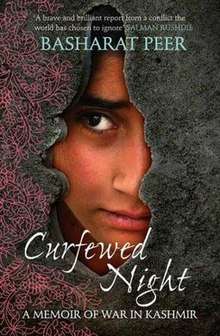Curfewed Night
Curfewed Night: A Frontline Memoir of Life, Love and War in Kashmir is a memoir on the conflict in Kashmir by the Kashmiri journalist Basharat Peer. It won the Crossword Prize for Non-Fiction and was chosen among the Books of the Year by The Economist and The New Yorker.[1]
 | |
| Author | Basharat Peer |
|---|---|
| Country | India |
| Language | English |
| Genre | Memoir |
| Set in | Kashmir |
| Published | 2010 |
| Publisher | Random House |
| Pages | 256 |
| Awards | Crossword Prize for Non-Fiction |
| ISBN | 978-1439109113 |
Plot
The book is a depiction of the author's rather personal tale of his life in the militant 1990's of Kashmir. Despite his family’s pleas, the Jammu Kashmir Liberation Front insurgents attack an Indian convoy close to their village. The army’s reprisals are expected to be swift and the family quickly grab their possessions and leave. In the end they return home to find only a few bullets stuck in the walls, which Peer’s grandfather pulls out with pliers.
A few years later Peer’s father survives a militant attack on him, justified by the fact that he is a civil servant in a government seen to be run by Delhi. He was, according to rumour, betrayed by a jealous rival at work.
After becoming a journalist for an Indian newspaper, Peer reports on other wars far away from home but is inevitably drawn back to Kashmir.
The second half of his book records his interviews with the victims of the army occupation. Another sinister development is the increasing prominence in the conflict of Pakistani-funded militant groups such as Lashkar-e-Taiba and Jaish-e-Mohammed, which carry out suicide attacks in Kashmir, India and even in Pakistan itself against Sufi and Shia mosques. These groups also often have links with the Taliban.
The book ends in April 2005, with the hopeful resumption of a bus route between Srinagar and Muzaffarabad, the capitals of the Indian- and Pakistani-administered regions of Kashmir. But five years on, despite occasional gestures from both the governments, freedom is still a distant prospect for the people of Kashmir.
Reviews
The book was well received. The New York Times described it as "an instructive primer on the conflict mixed with literary reportage on its human toll".[2] and praised in the Guardian by Kamila Shamsie for the way it brought the conflict "into the lives of Kashmiris".[3] The noted historian William Dalrymple, writing in The Guardian said an extraordinary book, a minor masterpiece of autobiography and reportage and called it a "classic account" of the conflict.[4]
Adaptation
Basharat Peer is screenplay writer of Indian Bollywood film Haider, which is a combination of both Hamlet and Curfewed Night.
References
- "Basharat Peer's 'Haider' and 'Curfewed Nights' lifts the veil on conflict in Kashmir | Latest News & Updates at Daily News & Analysis". dna. 2015-01-18. Retrieved 2017-09-21.
- Najar, Nida (2010-02-24). "Witnessing Kashmir's Invisible War - NYTimes.com". Artsbeat.blogs.nytimes.com. Retrieved 2013-07-04.
- Kamila Shamsie (2010-06-05). "Curfewed Night by Basharat Peer | Book review | Books". London: The Guardian. Retrieved 2013-07-04.
- William Dalrymple (2010-06-20). "Curfewed Night | Book review | Books | The Observer". London: Guardian. Retrieved 2013-07-04.